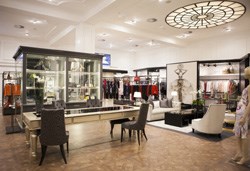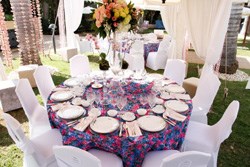
Top stories





Energy & MiningGlencore's Astron Energy gears up with new tanker amidst Sars dispute
Wendell Roelf 10 hours

More news



















Logistics & Transport
Uganda plans new rail link to Tanzania for mineral export boost








Value... Is it about the calibre of your guest list? Or the status of the guests who attended? Is it a tally of the traffic moving through your exhibition stand? Or the nature of follow-up enquiries received after your last product launch? Many businesses don't know where, when or how to begin and often, to their detriment, make decisions with the heart; engaging a supplier on the strength of a personal relationship with a preferred event management company.
Value often embraces intangible assets and in the early '90s, Harvard produced the BSC - the balanced scorecard - that helped many companies score value as a means of singling out quantifiable results. The overriding attribute of Harvard's scorecard was its ability to closely align those scores with the classic strategic objectives that many businesses conform to - so that "value", whatever shape it may take, was closely linked and supportive of the goals of the company.
The calibre of guest list, final guest attendance figures, sales volumes - basically every performance measure you can name, are all important when evaluating a supplier, but as Harvard's BSC dictates, the outcomes have to correlate directly to where a business is heading strategically.
So right at the top of my scorecard is the notion of the concept. Is GRC taking a different approach when interpreting a client's brief, or are we following a been-there-done-that formulaic route?

I believe that questioning the client's strategic objective, having a thorough understanding of the client's brand, value proposition, brand positioning and identity are crucial to articulating a brand's characteristics in an experiential way and leaving an indelible impression. The USA, considered the gold standard in the special events industry, regards a conceptual approach as the 'silver bullet' that guarantees success.
As any sassed marketing executive would know, American event producers methodically research the client before recommending a plan. For example, they undertake full SWOT and environmental analyses; review the client's USPs and undertake a brand audit. This intel dictates the creative route they should take.
Next on the list is aesthetics. Does my event producer have the capacity to leave a lasting visual impression on my guests' and clients' minds? I believe "synesthesia" is crucial to the success of an event. The aesthetics of any event should literally attack all five senses, from sight, to smell, to sound, to taste, and finally, touch.
When we launched the new store experience for D'ore, a well-known Sandton City ladies wear store, we took no prisoners when appealing to the senses. From burning aromatherapy oils to seduce and relax guests, piping nostalgic Dina Moran to evoke warm memories, and creating large, oversized paper and origami gown installations for the shop front as a means of prompting passers-by to really question and engage with the store's appeal. I believe that to create a lasting memory, the wow factor in "synesthesia" must truly be wow or nothing at all.
Too often, the store is known as "that boutique catering for older women", so aside from creating a very contemporary experience, we ensured that the guest list mirrored those modern, youthful qualities of D'ore's new positioning - people like Leeanne Liebenberg and her hubby, Nicky Van Der Walt, as well as Maira Koutsoudakis and several other well-known South Africans, all contributing to the evening's success.
Crowdtap, a New York-based collaborative marketing firm - named recently on Forbes' 100 Most Promising Companies - is spearheading the "collaborative marketing" revolution, which I believe should be taken advantage of in South Africa, specifically in eventing. We use collaboration as a means, not only of enhancing the overall guest experience by adding additional brand experiences to engage with, but also allowing the brands to reach into other's non-core markets and promote themselves. Moreover, it gives the brands' respective owners the opportunity to gain knowledge, building their expertise in the process and adding to the evolution of their own brands.

We collaborated with Levi Jeans at Fashion Week a few years ago, prompting viewers to really question whether denim is just an Indy-culture icon, or whether it should be deemed as haute couture. So we added a typical Damien Hurst twist to our show, by custom-painting denim as ball gowns, invoking a sense that haute couture can really be enjoyed by all, not just by the elite.
Fourth on the value scorecard is trust. While clients entrust an event manager with a designated spend, the producer, more importantly, must show a return on this investment. A producer's industry profile, their proven experience and a high calibre of client representation all contribute to the compelling sense of trust a client should feel when evaluating an event's success.
Last, but by no means least, is service. Is my events agency delivering timeously? Is it accessible? In other words, can it relate to me, and I to it and can I access it at the drop of the proverbial hat? Is it able to foresee challenges that may negatively impact on the success of my event? Is it managing my budget responsibly? Is it exceeding my expectations? Is it as passionate about my brand as I am?
As many will remember, there was much fuss around the Gupta wedding. Can you imagine the level of stress experienced by that poor couple as they planned such a mammoth event? So the onus was on us, as producers of the five-day celebration, not only to deliver exactly on what was promised (through story boards, programmes, themes and costings), but also to exceed their expectations - and we did it - we delivered far more than they expected despite very trying circumstances.